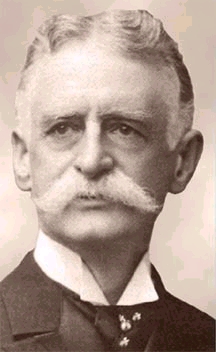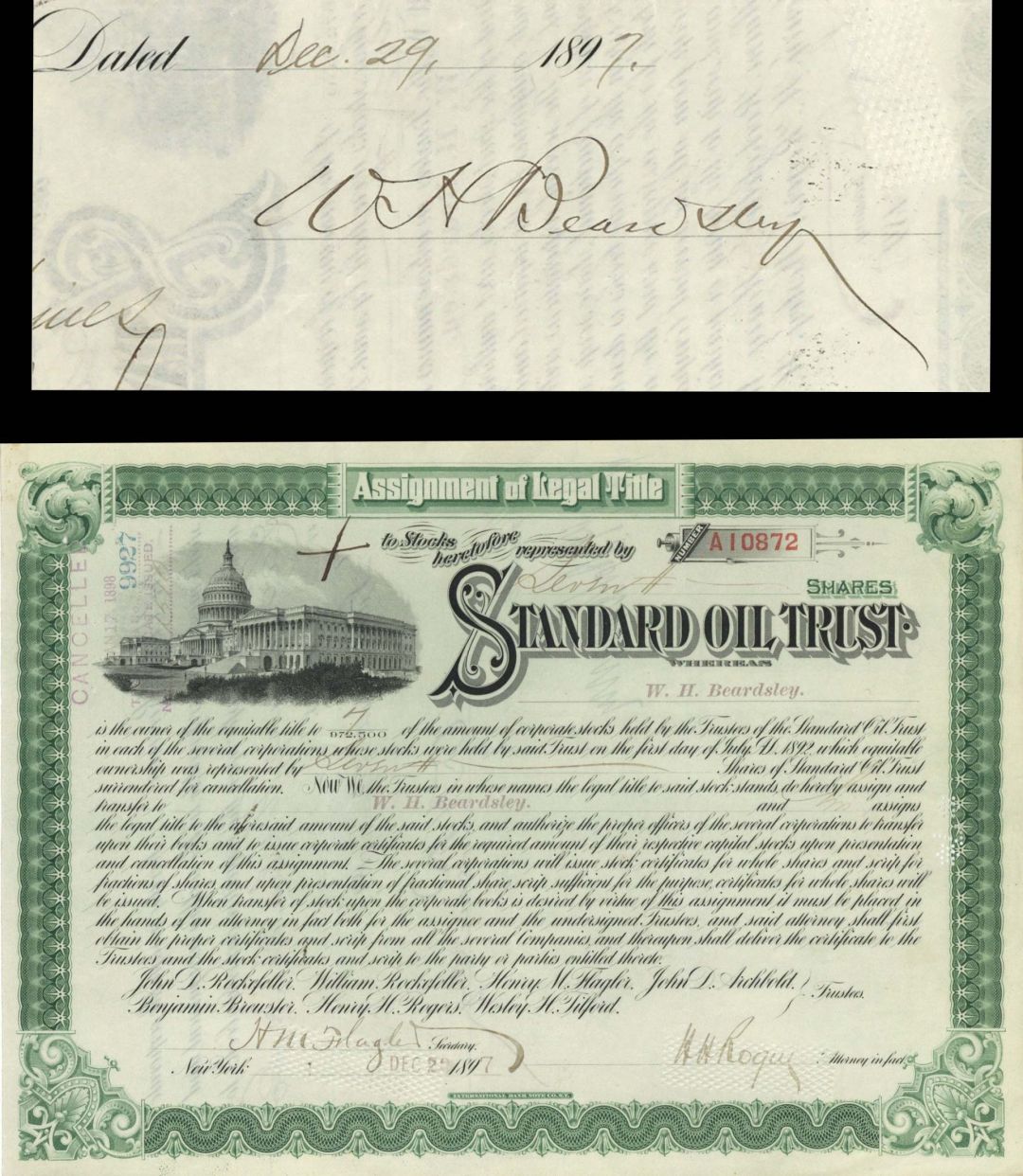Standard Oil Trust issued to and signed by William Henry Beardsley, also Flagler and H.H. Rogers - 1897 dated Autograph Stock Certificate
Inv# AG2286 AutographOhio
Stock issued to W.H. Beardsley and signed on back. Also signed by H.M. Flagler as secretary and H.H. Rogers as president. Rare!

William Henry Beardsley (April 7, 1852 - December 13, 1925) served as the private secretary to Henry Flagler, the Chairman of the Florida East Coast Railway Company. Beardsley acted as the private secretary to Henry Flagler and served as the Chairman of the Florida East Coast Railway Company. Born on April 7, 1852, in Cleveland, Ohio, he was the son of I. L. Beardsley, a journalist from New York who moved to Cleveland in 1838. I. L. Beardsley was instrumental in founding the 'Plain Dealer' and later transitioned into the wholesale grocery business. Mr. Beardsley completed his education in Cleveland, graduating from Central High School in 1869. He began his career working with his father in the grocery sector before moving to New York. From 1880 to 1890, he was associated with the Standard Oil Company. In 1890, H. M. Flagler, a co-founder of Standard Oil, appointed Mr. Beardsley as his financial representative. He later assumed the position of treasurer for the Florida & East Coast Railroad, the Florida East Coast Steamship Company, and all properties managed by Mr. Flagler.

Henry Morrison Flagler (January 2, 1830 – May 20, 1913) was an influential American industrialist and one of the founders of Standard Oil, originally established in Ohio. He played a significant role in the development of Florida's Atlantic coast and was the founder of the Florida East Coast Railway. Additionally, he is recognized as a co-founder and substantial investor in the cities of Miami and Palm Beach, Florida.

Henry Huttleston Rogers (1840-1909) was born into a working-class family in Mattapoisett, Mass. He was the son of Rowland Rogers and Mary Eldredge Huttleston Rogers. Both parents had roots back to the pilgrims, who arrived in the 17th century aboard the Mayflower. His mother's family earlier had used the spelling "Huddleston" rather than "Huttleston," and Henry Rogers' name is often misspelled using this earlier version.
In 1861, 21-year-old Henry pooled his savings of approximately $600 with a friend, Charles P. Ellis. They set out to western Pennsylvania and its newly discovered oil fields. Borrowing another $600, the young partners began a small refinery at McClintocksville near Oil City. They named their new enterprise Wamsutta Oil Refinery.
In 1870, John D. Rockefeller formed Standard Oil Company of Ohio and started his strategy of buying up the competition and consolidating all oil refining under one company. It was during this period that the Pratt and Henry Rogers interests were brought into the fold. By 1878 Standard Oil held about 90% of the refining capacity in the United States.
In the early 1871-72, H. H. Rogers was working for Pratt and Company and other refiners became involved in a conflict with John D. Rockefeller, Samuel Andrews, and Henry M. Flagler and the infamous South Improvement Company. South Improvement was basically a scheme to obtain secret favorable net rates from Tom Scott of the Pennsylvania Railroad and other railroads through secret rebates. The unfairness of the scheme outraged many independent oil producers and owners of refineries far and new alike.
His final business achievement, working with partner William Nelson Page, was the building of the Virginian Railway from the coal fields of southern West Virginia to port near Norfolk at Sewell's Point, Virginia, in the harbor of Hampton Roads. For many years, it was labeled both an engineering marvel and the "richest little railroad in the world," forming part of today's rail network for Norfolk Southern.
While considered ruthless in business matters, Henry Rogers also had a much kinder and generous side. His hometown of Fairhaven, Massachusetts continues to enjoy his many infrastructure gifts. Rogers' late life friendships included such diverse persons as Mark Twain, Ida Tarbell, Helen Keller, and Booker T. Washington.
Rogers was a low-profile philanthropist with a widely hated public image as a robber baron. It was only after his death in 1909 that Dr. Washington felt he could publicly reveal that, over a period of more than 15 years, Henry Rogers had been funding over 65 small country schools and several larger institutions in the South for the betterment and education of African Americans. Dr. Washington not only credited Rogers with substantial aid and encouragement, but with instituting the then-innovative procedure of matching funds. Rogers felt that as well as extending the financial reach, their participation contributed to the beneficiaries' self-esteem and steps to self-sufficiency. He was listed in a 1996 study as one of the 25 all-time most wealthy individuals in United States history.











Ebay ID: labarre_galleries